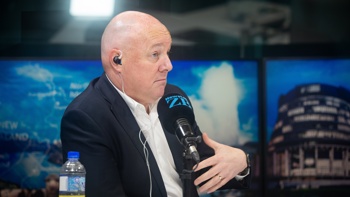Prime Minister Chris Hipkins says his government has been consistent on New Zealand’s foreign policy with China, as he addressed reports that his Foreign Minister Nanaia Mahuta received a “haranguing” at the hands of her Chinese counterpart.
Hipkins made his first major foreign policy speech as Prime Minister, delivered in Wellington to the New Zealand Institute of International Affairs.
Hipkins said he balanced New Zealand’s position with China and other countries by being clear with his message.
“It’s clearly different from our own,” Hipkins said of China’s political system.
“We have a broad range of relationships. Clearly, we have long historic ties with some countries.”
Hipkins said he wasn’t worried China would see the two countries’ disagreements as “a snub”.
“I think the trips are delivering good outcomes for New Zealand,” he said.
Hipkins addressed reports that Mahuta received a “haranguing” at the hands of her Chinese counterpart Qin Gang, in a March meeting this year.
Reports of that conversation, published in The Australian, leaked out shortly before Hipkins’ trip to China last month.
Hipkins said the “haranguing” of Mahuta indicated a “robust” relationship with China.
“Reports emerged just before my trip of a robust conversation between our Foreign Minister Nanaia Mahuta and the Chinese Foreign Minister,” Hipkins said.
“You might have noticed we didn’t deny that,” he said.
Hipkins used the episode as an example of the way New Zealand conducts its foreign policy.
“Our approach has always been that we are consistent in asserting our interests, we are predictable as we advance our values and we are respectful as we engage in our relationship with China,” Hipkins said.
“A strong, mature and complex relationship means we will have those tough conversations, just as I also raised areas of disagreement with the Chinese leadership when I was in Beijing,” he said.
Hipkins said it was “better to be talking than not”.
“Dialogue delivers greater security,” he said.
He added that while New Zealand’s economic interests in China were significant, there were ways in which China challenged New Zealand’s national interests saying that New Zealand would disagree with China on those matters.
“However, putting up walls and closing doors doesn’t serve us well in the long term and engagement is always preferable to isolation,” Hipkins said.
He described China as New Zealand’s “most complex relationship”.
Another remark likely to prick the ears of China-watchers related to the Five Eyes intelligence-sharing agreement between New Zealand, Australia, United States, the United Kingdom and Canada.
Hipkins said this “remains a cornerstone of New Zealand’s security”.
“Separately, because we share with those countries bonds of history and fundamental democratic values, we are strengthening our policy dialogue across a range of areas where we share common interests, with New Zealand hosting the annual Five Country Ministerial meeting here in Wellington just a few weeks ago,” he said.
On a New Zealand-European Union trade agreement, Hipkins said the country was a “big winner” in trade with the EU.
“We’re feeling very optimistic about [the European parliament ratifying the deal],” Hipkins said.
“One of the advantages of going to Nato is I get to meet the leaders face-to-face.”
The speech had a focus on defence and security, noting that the world was in a more uncertain place.
He said the Government would shortly publish an “interrelated set of strategic policy documents and assessments, spanning across New Zealand’s national security, defence, and foreign policy – including New Zealand’s first National Security Strategy”.
The speech namechecked different regions of the globe, and Hipkins’ outlook on them.
Australia received the warmest words, with Hipkins describing the relationship as “the strongest it has been in decades”.
“In both Australia and Prime Minister Albanese New Zealand has a close friend and ally,” Hipkins said.
He said recent citizenship changes made by Australia, which allow New Zealanders to more easily take Australian citizenship, had improved the relationship.
Hipkins described the United States as New Zealand’s “long-standing friend and partner”.
“The US has long been pivotal to setting up and maintaining the system of international rules and norms that helps keep New Zealanders and our interests safe,” he said.
Hipkins said New Zealand would be “actively engaged” in President Joe Biden’s key regional economic agenda, the Indo-Pacific Economic Framework for Prosperity.
He said New Zealand’s place was “firmly in the Pacific” and that despite the world’s focus on the Pacific as a region of geopolitical competition, the issue raised first by the Pacific itself was always climate change.
“Our commitment to provide over half a billion dollars in climate finance in the region is being rolled out, but our neighbours are asking more of us,” Hipkins said.
“They also ask us to use our voice on the world stage to draw attention to the climate crisis in our region and to use our relationship with countries that are large polluters to increase their efforts to reduce emissions.
“That is a commitment my government will continue to make, both through leading by example at home, while exerting pressure on others to do more internationally,” he said.
Take your Radio, Podcasts and Music with you









